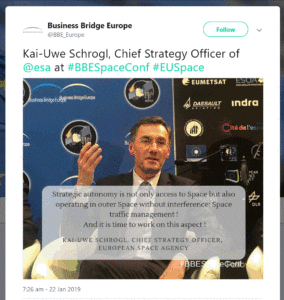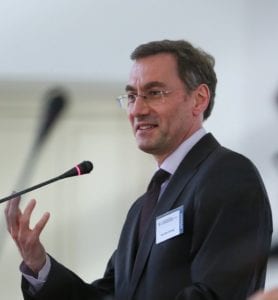 On 7 July 2021 the “European STM Conference” took place in a virtual format. Member States from the European Union and the European Space Agency together with EU institutions and ESA Executive endorsed an Outcome paper entitled “Fostering a European approach on Space Traffic Management”. SpaceWatch.Global Publisher Torsten Kriening talked about the results and impact of the Conference with Prof. Dr. Kai-Uwe Schrogl, who is seconded from the European Space Agency (ESA) to the German Federal Ministry for Economic Affairs and Energy in Berlin to support the Presidency Trio (Germany, Portugal, Slovenia) of the Council of the European Union and who was in charge of the preparation and organisation of the European STM Conference.
On 7 July 2021 the “European STM Conference” took place in a virtual format. Member States from the European Union and the European Space Agency together with EU institutions and ESA Executive endorsed an Outcome paper entitled “Fostering a European approach on Space Traffic Management”. SpaceWatch.Global Publisher Torsten Kriening talked about the results and impact of the Conference with Prof. Dr. Kai-Uwe Schrogl, who is seconded from the European Space Agency (ESA) to the German Federal Ministry for Economic Affairs and Energy in Berlin to support the Presidency Trio (Germany, Portugal, Slovenia) of the Council of the European Union and who was in charge of the preparation and organisation of the European STM Conference.
Mr. Schrogl, what is the main message of the European STM Conference?
Europe has realized the importance of STM for the future use of space. It states that STM is the top multidimensional space issue of this decade. This is manifested in the Conference Outcomes document “Fostering a European Approach on Space Traffic Management” . In order to meet the broad interest of the space sector in this Conference we – this is the Germany team with Ardita Shilova-Preci, Peter Stubbe and myself leading preparation together with the Slovenian team with Tanja Permozer, Sabina Kolesa and Gregor Novak, hosting the Conference as its first highlight activity of its Presidency – proposed to record the Conference and put it online on the Slovenian EU Council Presidency website. This is a signal of transparency.
Is the Conference also a signal against the US and its Space Policy Directive on STM?
Clearly no. We have a long-standing and continued strategic partnership, cooperation and coordination with the US to the mutual benefit. Regarding outer space as a global common, we promote the approach of multilateralism. As a unilateral setting of norms is not acceptable, as also in the field of space resources, we consequently promote the multilateral establishment of norms in the field of STM. We also demand the respect for the rule of law in outer space, challenged today by some actors. As a consequence of the European STM Conference, we offer a leadership role of Europe on this basis in the international arena.
You mentioned the multiple dimensions of STM. Could you please elaborate on this?
The Conference Outcomes document points out that STM at least covers research and innovation activities, the development of capabilities, operational coordination services, regulatory activities, including standardisation as well as security dimensions. We also consider the economic dimension as well as the various levels from global, regional to national.
The economic dimension has not yet been in the forefront of considerations. What is happening and developing in this field?
Actually, we brought up STM in the context of our German EU Council Presidency initiative “Establishing key principles for the global space economy”. So, we intended to make this nexus clear from the beginning. The global space economy is expected to grow to 1 trillion Euros by 2040. It can only meet this perspective, if we guarantee safe operations in outer space. Additionally, STM itself will become a business case with technologies and services provided by the private sector for which a level-playing field in an open market has to be established.
Can you specify the security and military dimensions of STM as discussed at the Conference?
We approach STM as a civil regulatory issue, which has high-security relevance and implications. This is why the close coordination of civil and military institutions is perceived in Europe as a must and can build inter alia on the successful practise in EU SST. As with comparable regulatory regimes for aviation and frequency management, we will have to find a tailor-made approach to handle both elements in STM. Of course, neither of the two other fields provides a simple blueprint for STM. But we have already investigated a lot in identifying practices, which can be taken up and adapted. Important is to note that we rule out a subordination under military considerations and operative approaches as it has already been feared and expressed in debates on a perceived general “securization” of space activities.
Where does Europe stand after this conference?
We found an agreement on the relevance and importance of STM for Europe, which is the basis for any further action. We also conducted a thorough identification of what we have and what we further need. This has not been done by consultations but amongst the Member States together with the institutions. We also launched a discussion of the roles of governmental actors on the national and European level and private actors as industry and academia
Is the last point not particularly difficult for Europe with its inscrutable set of actors and levels?
I always point out that Europe does not have a particularly confusing set of actors and levels. You just have to compare it with the multitude and complexity of actors in the space arena in the US or in China. Europe has even the advantage of decade-long experience in balancing levels and institutions and this mechanism is also at work in STM. Once an understanding is achieved, Europe acts more reliable and stable than many other actors. In this context, I should say, that in parallel to the Conference preparation, we have set out in the Trio Presidency of EU plus the incoming French Presidency an STM- roadmap until next year.
What shall this roadmap achieve?
It brings together the various elements as the Conference Outcomes, studies performed currently under Commission contracts and the preparation of ESA for its next Council at Ministerial level foreseen for the end of 2022. Thus, we can establish the EU as the platform for the Member States, who have the regulatory competence, to prepare regulatory setups, continue to build on a newly strengthened EU SST Partnership and programme and establish ESA at its Council in 2022 as the architect for a European STM. We did not yet look into institutional questions, as for example, a potential extension of the mandates of the European Union Aviation Safety Agency (EASA) in Cologne and/or Eurocontrol in Brussels to STM, but this will be taken up as well.
You and the team spent a considerable time and effort in setting up the preparation process. As the negotiator of the document, are you satisfied with the outcome and perspective of the Conference?
I have been working on STM since the early 2000s as the study leader for the 2006 pioneering International Academy of Astronautics (IAA) study and its follow-up study of 2018. When I was chair of the Legal Subcommittee of UNCOUPOS, we put STM in 2016 on the agenda of the Subcommittee. At the 2019 Business Bridge Europe Conference, I introduced STM on this European stage and Commissioner Breton took the same spot one year later to highlight STM leading to the rollout as flagship for Europe soon afterwards. So, it is also a personal satisfaction to see STM being acknowledged as a top priority.
Are there any lessons to be drawn from the preparatory process of the Conference?
We introduced STM in the German EU Council Presidency with a clear view of making it a key European task. It was the EU-ESA Space Council of 20 November 2020, which called for the Conference and this is why all Member States of EU and of ESA together with EU institutions and the ESA Executive participated in its altogether nine preparatory meetings we organised and the Conference itself. Europe was able to show its full potential and also its openness. We held for example a hearing in March, where we heard 40 presentations from governments, industry, academia and international partners. The diversity was enormous and showed the readiness of Europe to listen also to intergovernmental organisations as the International Telecommunications Union (ITU) or non-governmental organisations as the Space Generation Advisory Council (SGAC) or the World Economic Forum (WEF). We also did not shy away from inviting SpaceX to explain the STM-related issues regarding the Starlink project, which is one of the key drivers for the urgency to rapidly prepare rules.
Is there a specific message, you want to point out in the Conference output?
There are two. First, I am extremely glad that we were able to make a strong normative statement reading “Europe should continue to foster its status as a role model for responsible behaviour in space.” This is indeed a particularly good ambition aiming also at common benefit. Secondly, Europe promotes multilateralism, since STM is a global challenge, there can only be universal STM not a European, an American or an Asian one and Europe leads in establishing norms and rules through multilateralism and in the spirit of freedom of outer space and its peaceful uses. With these two pillars, Europe wants to make a difference in the international arena.

Prof. Dr. Kai-Uwe Schrogl is currently seconded from the European Space Agency ESA to the German Federal Ministry for Economic Affairs and Energy in Berlin to support the German Presidency of the Council of the European Union and the Presidency Trio up to the end of 2020. Until 2019, he was the Chief Strategy Officer of ESA in Paris, France. From 2007 to 2011, he was the Director of the European Space Policy Institute (ESPI) in Vienna, Austria. Prior to this, he was the Head of the Corporate Development and External Relations Department in the German Aerospace Center (DLR) in Cologne, Germany. Kai-Uwe Schrogl is the President of the International Institute of Space Law (IISL), the global non-governmental association of space lawyers from almost 50 countries. From 2014 to 2016 he served as the Chair of the UNCOPUOS Legal Subcommittee.





